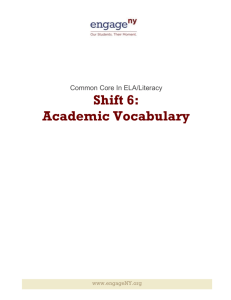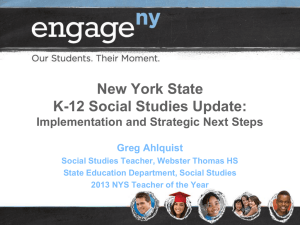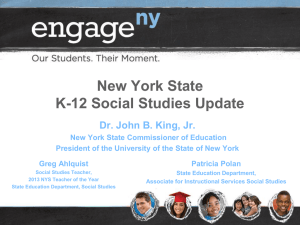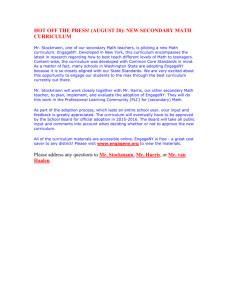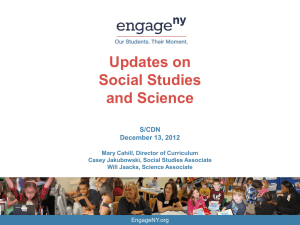NYS Common Core K-8 Social Studies
advertisement
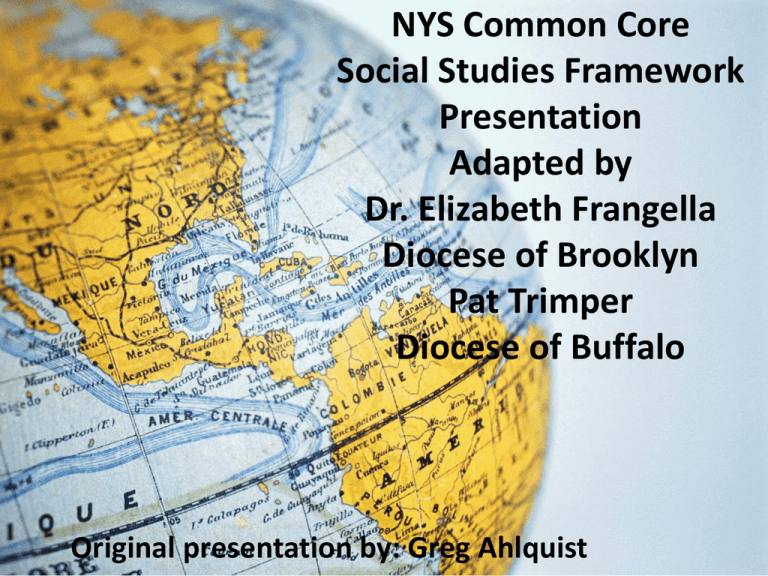
NYS Common Core Social Studies Framework Presentation Adapted by Dr. Elizabeth Frangella Diocese of Brooklyn Pat Trimper Diocese of Buffalo Original presentation by: Greg Ahlquist Session objectives • To help educators gain a deeper understanding of the NYS Social Studies Framework, the Social Studies practices and skills, and the NYS Field Guide. • To discuss how the framework should change teaching and learning by working through a sample inquiry. • To navigate the toolkit and use the inquiry design blueprint. Our Work in Social Studies Framework (content and skills) Curriculum (inquiry, Toolkit Project and resources) Assessment (Regents and local) Making the Most of our Time… • With a partner, answer the following questions: – What do you already know about the NYS SS Framework? – What are you most concerned about with the implementation of the Framework? – What do you hope to get out of today’s session? C3 Inquiry Arc What is the C3 Framework? Inquiry Arc • Dimension 1: Developing Questions and Planning Inquiries • Dimension 2: Applying Disciplinary Tools and Concepts (Civics, Economics, Geography, and History) • Dimension 3: Evaluating Sources and Using Evidence • Dimension 4: Communicating Conclusions and Taking Informed Action IDM follows C3 Inquiry Arc If students are asked a COMPELLING question…… In the middle are the SUPPORTING QUESTIONS, FORMATIVE TASKS, AND SOURCES Students answer in the form of a SUMMATIVE ARGUMENT Inquiry Arc Why? What? How? Same 5 NYS Social Studies Learning Standards • Standard 1: History of the United States and New York • Standard 2: World History • Standard 3: Geography • Standard 4: Economics • Standard 5: Civics, Citizenship, and Government 9 EngageNY.org Course of Study Remains Same Grade Course of Study Kindergarten Grade 1 Grade 2 Grade 3 Grade 4 Grade 5 Grade 6 Grade 7 Grade 8 Grade 9 Grade 10 Grade 11 Self and Others Grade 12 10 My Family and Other Families, Now and Long Ago My Community and Other Communities Communities around the World Local History and Local Government The Western Hemisphere The Eastern Hemisphere United States and New York History – I United States and New York History – II Global History and Geography – I Global History and Geography – II United States History and Government Participation in Government Economics and Economic Decision Making EngageNY.org NY Social Studies Framework 3 Instructional Shifts • Focus on Conceptual Understanding. • Foster Student Inquiry, Collaboration, and Informed Action. • Integrate Content and Skills Purposefully. 11 Instructional Shift #1: Focus on Conceptual Understanding From To Facts Concepts and ???? Content Knowledge Breadth of Topics Depth within ???? Topics Recall Transfer and ???? Connections 12 Instructional Shift #2: Foster Student Inquiry, Collaboration, and Informed Action From To Teacher as Disseminator Teacher as Facilitator ???? of Investigation Students Learn Facts from Textbook Students Investigate the Social Sciences ???? Using Multiple Sources Students Retell Interpretations Students Construct Interpretations ???? and Communicate Conclusions 13 Instructional Shift #3: Integrate Content and Skills Purposefully FROM A Social Studies Classroom Where… TO A Social Studies Classroom Where… Students experience an additional nonfiction reading class or textbook focused instruction Students learn to read, discuss, and write like social scientists Students develop literacy skills Students develop disciplinary and social studies practices literacy skills and social science separately practices in tandem Students learn content knowledge Students integrate and apply concepts, skills, and content knowledge 14 From the Field Memo March 3, 2015 Candace Shyer “The content, skills, and social studies practices in the New York State K-12 Social Studies Framework must be built across grades K-12 for students to be successful on the social studies assessments required for a diploma. Instruction in ELA modules that incorporate social studies topics does not replace instruction in social studies, particularly in the development of social studies practices. All teachers of social studies in all grades should review the social studies practices, as well as the common core literacy skills for their courses, and incorporate them, along with content, into their instruction.” What do the shifts mean for instruction? • For each shift discuss: – What do I notice that is already in place? – What is new? – What are some next steps that can be taken? – What are some barriers? • Reminder of Shifts: – Focus on Conceptual Understandings – Foster Student Inquiry, Collaboration, and Informed Action. – Integrate Content and Skills Purposefully. 1 5 Points of Clarification: Commissioner’s Regulations changes, Social Studies Regents Exams, and Pathways Pathways & Assessment Changes 1. Commissioner’s Regulations will require Social Studies sequence of study for Grade 9, Grade 10, Grade 11, Grade 12 -Grade 9 Global was not required and this change ensures this course of study 2. New Global Regents Exam will assess ONLY 10th grade course (starting June 2018) 3. New US History and Government Regents Exam (starting June 2019) 4. In ALL pathways, all Students earning a Regents Diploma will: • Take a Balanced Curriculum including: American History, Global Studies, Science, LOTE, Art, Physical Education and Health 18 Social Studies Practices * 1. Gathering, Using, and Interpreting Evidence 2. Chronological Reasoning and Causation 3. Comparison and Contextualization 4. Geographic Reasoning 5. Economics and Economics Systems 6. Civic Participation * What skill/practice do I see when I observe a Social Studies lesson? 20 EngageNY.org Vertical Articulation of Social Studies Practices Literacy through social studies Connections between the C3 Framework and the CCR Anchor Standards Dimensionshttps://www.engageny.org/reso urce/grade-7-social-studies-making-sensecommon-sense-elarss7-81 D1: Developing Questions and Planning Inquiries D2: Applying Disciplinary Concepts and Tools ELA Connections R1 W7 SL1 R1-10 W7 SL1 L6 D3: Evaluating Sources and Using Evidence R1-10 W1, 2, 7-10 SL1 D4: Communicating Conclusions and Taking Action R1 W1-8 SL1-6 2 How to Read the Framework Key Idea Conceptual Understanding Content Specifications 4.5 IN SEARCH OF FREEDOM AND A CALL FOR CHANGE: Different groups of people did not have equal rights and freedoms. People worked to bring about change. The struggle for rights and freedoms was one factor in the division of the United States that resulted in the Civil War. (Standards: 1, 5; Themes: ID, TCC, SOC, CIV) 4.5a There were slaves in New York State. People worked to fight against slavery and for change. Students will examine life as a slave in New York State. Students will investigate people who took action to abolish slavery, including Samuel Cornish, Fredrick Douglass, William Lloyd Garrison, and Harriet Tubman. 23 4.5 IN SEARCH OF FREEDOM AND A CALL FOR CHANGE: Different groups of people did not have equal rights and freedoms. People worked to bring about change. The struggle for rights and freedoms was one factor in the division of the United States that resulted in the Civil War. (Standards: 1, 5; Themes: ID, TCC, SOC, CIV) 4.5a There were slaves in New York State. People worked to fight against slavery and for change. Students will examine life as a slave in New York State. Students will investigate people who took action to abolish slavery, including Samuel Cornish, Fredrick Douglass, William Lloyd Garrison, and Harriet Tubman. Catholic Connection: Solidarity We are one human family. We are brothers and sisters even if we are different. We need to get along with each other. Solidarity means not fighting but helping others. We should love our neighbors all over the world. By the completion of Grade Four, the learner will: realize that the Lord calls each of us to live a life of service. Compelling questions 1. Intellectually meaty • Reflects an enduring issue, concern, or debate in the field • Demands the use of multiple disciplinary lenses and perspectives 2. Kid friendly • Reflects a quality or condition that we know children care about • Honors and respects children’s intellectual efforts Compelling…or not so compelling? • Where are we? • What were the causes of the Industrial Revolution? • Why is Albany the capital of New York? • Can Canada and the US be friends forever? • Who won the Cold War? • Who are our community helpers? • What’s the deal with hair? Supporting questions • • • • Support and extend the Compelling Question Represent the disciplinary knowledge desired Reflect the sources selected Inspire formative assessments Formative Performance Tasks • Connect sources to Supporting Questions • Help students build their emergent understandings • Contribute to students’ abilities to respond to the Summative Performance Task. Summative Performance Task: Argument • An argument: a collection of claims supported by relevant evidence, which can be considered an answer to the question investigated by the research • ARGUMENT STEMS- are also considered THESIS STATEMENTS. They are CONTENT MARKERS. If something is NOT in your argument stem, you have made a wrong turn. 3, 4 IDM: Taking Informed Action Community School Classroom Research an issue relevant to an Inquiry Understand the problem Identify the problem and possible civic solutions or actions Assess Organize a boycott or fundraising event Circulate a petition School newspaper special issue Organize an assembly Bringing stakeholders together for a forum Write a letter to the editor Apply an Action Resources to Explore • www.C3teachers.org • https://www.engageny.org/resource/newyork-state-k-12-social-studies-resourcetoolkit-kindergarten-grade-4 • www.NOVELNEWYORK.org 5 • www.loc.gov Resources • www.C3teachers.org • https://www.engageny.org/resource/background-newyork-state-k-12-social-studies-framework • https://www.engageny.org/resource/new-york-state-k12-social-studies-field-guide • https://www.engageny.org/resource/new-york-state-k12-social-studies-resource-toolkit-kindergarten-grade-4 • https://www.engageny.org/resource/new-york-state-k12-social-studies-resource-toolkit-grades-5-8 • www.NOVELNEWYORK.org • www.gutenberg.org
